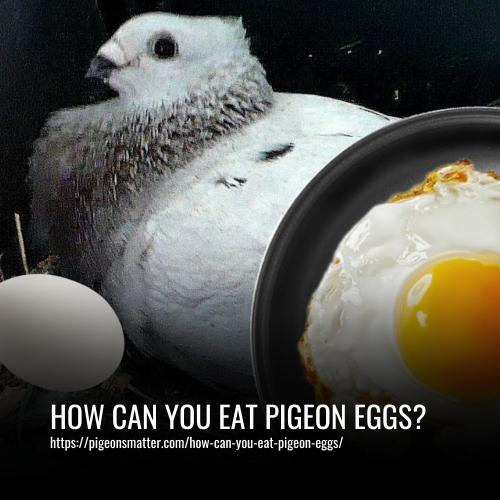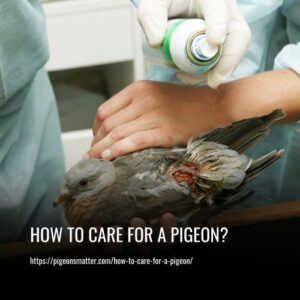Pigeon eggs can be cooked in a variety of ways, but they are best suited for pan-frying. Due to their small size, they are not ideal for scrambling as too many eggs would be required.
The best way to cook pigeon eggs is to steam them, peel them, deep-fry them, and then eat them whole. Additionally, pigeon eggs can also be boiled, fried, or baked.
They are a good source of protein and are high in iron. Pigeons lay their eggs in nests, and the female incubates them until they hatch. Once the chicks hatch, they are fed by both parents. Overall, pigeon eggs are edible and can be a nutritious addition to a meal.

How Can You Eat Pigeon Eggs Safely?
It is important to take certain precautions when eating pigeon eggs. Before eating them, make sure they have been properly cooked and are not raw. Additionally, be sure to wash your hands thoroughly before handling the eggs and during the cooking process.
1. Ensure Freshness:
Make sure the pigeon eggs are fresh and eat them within a day or two of being laid.
2. Thorough Cooking:
Cook the pigeon eggs thoroughly until the yolks are firm, not runny.
3. Avoid Egg Whites:
Do not eat the egg whites as they may contain the harmful bacteria Salmonella.
4. Wash Hands:
After handling pigeon eggs, wash your hands thoroughly with soap and water to prevent the spread of bacteria.
5. Don’t Feed Children:
Pigeon eggs should not be given to children under the age of 5 due to the risk of food poisoning.
By following these safety tips, you can enjoy pigeon eggs without any worry. Remember that eating pigeon eggs safely is important for avoiding foodborne illnesses.
What Do Pigeon Eggs Taste Like?
Pigeon eggs taste similar to chicken eggs but with some key differences. They are more gelatinous and have a rubbery bounce when bitten into. The egg whites are denser and clearer when cooked, with the yolk being bigger and richer in taste. Pigeon eggs also have a stronger, more eggier smell compared to chicken eggs.
Cooking them can be a bit delicate, as they take a long time to hardboil and need to be cooked one at a time to prevent breakage. Pigeon eggs are better suited for pan frying, as they are too small to scramble effectively.
They are best enjoyed steamed, peeled, deep-fried, and eaten whole. Overall, pigeon eggs have a distinct texture and flavor compared to chicken eggs and require some care in preparation.
Where Can You Buy Pigeon Eggs?
Pigeon eggs are difficult to come by for consumption due to the birds’ finicky breeding habits. A breeding pair of pigeons typically produces only about 12 eggs per year, and removing an egg can disrupt their breeding cycle. As a result, it is not common for pigeon eggs to be available for purchase. Producers may use dummy eggs to keep pigeons productive when eggs are harvested, but pigeon eggs are still rare and come with a hefty price tag.
In the United States, pigeon eggs are mostly sold to high-end restaurants, and are not typically available to the average consumer. In other countries, they may occasionally be sold in markets by individual vendors. If you do find them in a US restaurant, you can expect to pay almost $30 per egg and may need to reserve the dish in advance.
Pigeon eggs go bad quickly and should be eaten the same day they’re laid to guarantee freshness, making them a rare and expensive delicacy for those who can find and purchase them.
Are Pigeon Eggs Good for You?
Yes, pigeon eggs are good for you. They contain less fat than chicken eggs, high levels of vitamins B1 and B12, as well as important minerals like zinc and iron. Pigeon eggs are also a high source of protein, with about 10 percent of the total egg being protein.
They are a good source of sulfur-containing amino acids, containing more of these specific amino acids than normal chicken eggs. In Chinese medicine, pigeon eggs are believed to be good for the kidneys, as they affect the yin jing which assures good circulation and replenishment of bodily fluids like blood.
Additionally, during the Al-Andalus period in Spain, pigeon eggs were considered an aphrodisiac, especially effective if cooked with onions in turnip juice. In the 1300s, Spanish people believed pigeon eggs were a cure for digestive issues caused by overeating.
Can You Eat Fertilized Pigeon Eggs?
Yes, you can eat fertilized pigeon eggs. Most fertilized eggs can be eaten, although the contents may make some Western diners uncomfortable. When eaten on the same day as fertilization, a fertilized pigeon egg won’t look much different than an unfertilized egg.
After a few days, the yolk develops red veins, which are safe to eat. By the time the eggs are a week old, a discernible chick will be inside the egg, and as the egg gets older, the chick will be bigger.
The remaining egg sac and every part of the chick are edible, including the relatively soft and chewable bones and beak. If the egg was about to hatch, the beak and feet may need to be discarded.
How Can You Tell If A Pigeon Egg Is Bad?
To tell if a pigeon egg is bad, you can:
- Look at the shell – A bad egg will have a cracked or brittle shell.
- Look at the color of the egg – A bad egg will often have a discolored shell.
- Feel the egg – A bad egg will be soft to the touch.
- Smell the egg – A bad egg will have a foul odor.
If you find a bad egg, remove it from the nest immediately and dispose of it.
FAQs
Pigeon eggs can be cooked in various ways, such as boiled, fried, and scrambled. It is important not to overcook them to avoid toughness and rubbery texture.
The taste of pigeon eggs varies among individuals. Some believe that they taste similar to chicken eggs, while others find them to have a more gamey flavor. There is no definite answer to this question as taste is subjective and can differ from person to person.
Yes, pigeon eggs are safe for human consumption, similar to other bird eggs. They are a good source of protein, vitamins, and minerals.
Pigeon eggs can be cooked in various ways, such as boiling, frying, or scrambling, much like chicken eggs. They can be used in recipes that call for eggs.
Pigeon eggs are smaller in size compared to chicken eggs, and their taste is often described as richer and creamier. In terms of nutrition, they contain similar nutrients but in slightly different proportions.
Pigeon eggs might not be as commonly available as chicken eggs in regular markets. You might find them in specialty food stores, farmers’ markets, or from local breeders who raise pigeons.
Fresh pigeon eggs, like other eggs, should have clean, intact shells. Check for any cracks or damage before using them. To test freshness, you can perform the float test: place the egg in a bowl of water; if it sinks and lies flat, it’s fresh; if it stands on one end, it’s still good but getting older; if it floats, it might be spoiled and should be discarded.
Generally, pigeon eggs are safe for consumption for most people. However, individuals with specific allergies to bird eggs should avoid them. It’s always recommended to consult with a healthcare professional if you have any dietary concerns or medical conditions before adding new foods to your die
Conclusion:
While pigeon eggs may not be a common choice for many, they offer a unique and delicious alternative for those looking to expand their culinary horizons. With their rich flavor and impressive nutritional profile, pigeon eggs can be a delightful addition to your diet. So why not give them a try? Break out of your culinary comfort zone and embrace the unexpected. Bon appétit!

